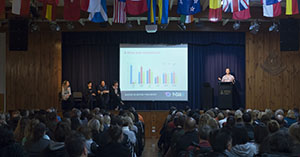Drink spiking is illegal and dangerous. How can we minimise the risk?
By Cheryl Critchley
Drink spiking involves putting alcohol or drugs into someone’s drink without their knowledge or permission.
This is illegal in all states and territories. But it is often unreported as those who experience it may not remember what happened and/or fear their stories will not be taken seriously.
Drink spiking can happen anywhere, including night clubs, parties, festivals and private homes. Women are more likely to have their drinks spiked than men.
It may involve slipping alcohol into a non-alcoholic drink, adding extra alcohol to an alcoholic drink, or putting prescription or illegal drugs (e.g. benzodiazepines, amphetamines or GHB – also called liquid ecstasy) into any drink.
Those affected may become impaired and vulnerable to robbery and/or sexual assault. An estimated one third of drink spiking incidents are associated with sexual attack.
The Better Health Channel has a good summary: https://www.betterhealth.vic.gov.au/health/healthyliving/drink-spiking
What are the signs?
The effects of drink spiking will depend upon the type drug used, the amount, what it is mixed with, your size and what you’ve already consumed.
Some victims become lightheaded and confused and may lose consciousness or later forget what happened. If you feel that something’ not right, it probably isn’t. Tell a friend Reach out to venue staff, who can help.
Drink spiking symptoms may include:
- feeling drunk, woozy or drowsy
- feeling “out of it” or drunker than expected
- mental confusion
- speech difficulties (such as slurring)
- memory loss
- loss of inhibitions
- nausea and vomiting
- breathing problems
- muscle spasms or seizures
- loss of consciousness
- an unusually long hangover
- a severe hangover when you had little or no alcohol to drink.
Source: Better Health Channel
Protecting each other
Planning ahead and supporting each other while out can reduce the risk of drink spoking.
Victoria Police suggests that before going out:
- tell someone where you are going
- decide on a place to meet at the end of the night
- carry the mobile phone numbers of your trusted friends
- encourage one person in the group to be the ‘designated driver’
While out, avoid sharing drinks or accepting them from strangers, don’t leave drinks unattended and watch where all your drinks are coming from. Monitor bar staff preparing and serving your drinks and try not to become isolated from your group.
To protect yourself and your friends:
- Party safely and socialise with trusted friends. Plan how you will watch out for each other.
- Buy your own drinks.
- If you are at a venue that serves drinks, watch the bartender prepare your drink.
- Don’t accept drinks from strangers.
- If you accept a drink from a stranger, accompany them to the bar and take it from the bartender yourself.
- Don’t drink anything that has been spiked and call it out if you see others doing it.
- Be wary if a stranger buys you a drink and it’s not what you requested.
- Don’t take your eyes off your drink. If you need to leave (to go to the toilet or dance, for example), ask a trusted friend to keep watch.
- Buy drinks in bottles with screw-top lids. Put it in your bag when you go to the toilet or dance.
- Don’t consume your drink if you think it may have been spiked. Discuss your concerns with the manager or host.
- Tell the manager or host immediately if you see someone spike a drink or suspect that drink spiking may be occurring.
Source: Better Health Channel
What to do if it happens
If you suspect drink spiking has occurred to you or someone else, alert a trusted person.
Try to find a safe space with the trusted person and watch anyone who may be affected.
If the person has an unusual reaction or is unwell, call Triple Zero (000) immediately and if needed go to a doctor or the closest hospital emergency department.
Tell health professionals you suspect drink spiking so urine and blood samples can be taken.
If you suspect a drug-assisted sexual assault has occurred, tell police or a sexual assault service such as the Domestic Family Violence Counselling Service (Australia).
Ambulance Victoria reassures young people that it doesn’t matter what they have taken, staff will treat them without judgment to ensure they are safe.
“Paramedics are here to help, but they need to know if someone has consumed drugs or alcohol and what is in their system to treat them effectively,” a spokesperson says.
“Conversations between paramedics and patients about such matters are confidential.”
Counting the cost
When drink spiking was raised on ABC Radio Melbourne, several parents revealed their children and young people they knew had had drinks spiked before being sexually assaulted.Victoria Police Chief Commissioner Shane Patton urges people to report such incidents to the police.
“I would absolutely urge anyone who’s been a victim of this kind of offending to come in and we will treat them with absolute confidentiality, we will be supportive and we will do our job,” he says.
“It is very much a crime. We can only act on what’s reported to us. We will believe them. We will act and we will investigate.”
Protecting patrons
Music Victoria’s Best Practice Guidelines encourage live music venues to ensure that staff are trained to observe and deal with any potential alcohol, drug or sexual harassment/assault issues.
The guidelines say staff should monitor patrons they believe may be the target of, or vulnerable to an instance of sexual harassment or assault, and actively monitor their wellbeing.
Patrons also need to know they can approach staff if needed, and appropriate action will be taken.
“All staff should be trained in how to identify and respond appropriately to incidents of sexual harassment or assault,” the guidelines say.
“Staff should be made aware that they will not be disadvantaged for reporting or responding to an instance of sexual harassment or assault within the venue.”
More information
Rape & Domestic Violence Services Australia says one in three drink spiking incidents are associated with a sexual attack, and these incidents are vastly under-reported. Four out of five victims of drink spiking are female.
The service urges anyone who thinks they have been sexually assaulted, you can talk to experienced counsellors, who can help you decide what to do next.
Rape & Domestic Violence Services Australia
https://www.rape-dvservices.org.au/
1800 Respect: National Sexual Assault, Domestic Family Violence Counselling Service
https://www.1800respect.org.au/
NSW Rape Crisis
1800 424 017
Victoria’s Centres Against Sexual Assault (CASA)
https://casa.org.au/
Crime Stoppers
https://crimestoppers.com.au/



